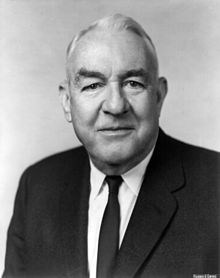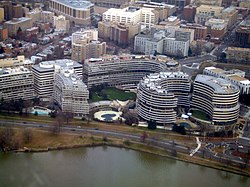Sam Ervin | |
|---|---|
 | |
| United States Senator from North Carolina | |
| In office June 5, 1954 – December 31, 1974 | |
| Preceded by | Clyde R. Hoey |
| Succeeded by | Robert Morgan |
| Member of the U.S. House of Representatives from North Carolina's 10th district | |
| In office January 22, 1946 – January 3, 1947 | |
| Preceded by | Joseph Ervin |
| Succeeded by | Hamilton C. Jones |
| Member of the North Carolina House of Representatives from the Burke County district | |
| In office 1931–1933 | |
| Preceded by | John Mull |
| Succeeded by | Francis Garrou |
| In office 1923–1927 | |
| Preceded by | Joseph Cooper |
| Succeeded by | John Giles |
| Personal details | |
| Born | Samuel James Ervin Jr. September 27, 1896 Morganton, North Carolina, U.S. |
| Died | April 23, 1985 (aged 88) Winston-Salem, North Carolina, U.S. |
| Political party | Democratic |
| Spouse |
Margaret Bruce Bell (m. 1924) |
| Children | 3, including Samuel |
| Education | University of North Carolina at Chapel Hill (BA) Harvard University (LLB) |
| Awards | |
| Military service | |
| Allegiance | |
| Branch/service | |
| Years of service | 1917–1919 |
| Rank | Private |
| Unit | 28th Infantry Regiment, 1st Infantry Division |
| Battles/wars | World War I |
| Watergate scandal |
|---|
 |
| Events |
| People |
Samuel James Ervin Jr. (September 27, 1896 – April 23, 1985) was an American politician who served as a U.S. Senator from North Carolina from 1954 to 1974. A Southern Democrat, he liked to call himself a "country lawyer", and often told humorous stories in his Southern drawl.[1] During his Senate career, Ervin was at first a staunch defender of Jim Crow laws and racial segregation, as the South's constitutional expert during the congressional debates on civil rights.[2][3] However, unexpectedly, he became a liberal hero for his support of civil liberties.[4] He is remembered for his work in the investigation committees that brought down Senator Joseph McCarthy in 1954 and especially for his leadership of the Senate committee's investigation of the Watergate scandal that led to the resignation of President Richard Nixon in 1974.[5][6]
- ^ Cite error: The named reference
countrylawyerwas invoked but never defined (see the help page). - ^ Campbell (2007)
- ^ Sawyer, Logan (2021). "Originalism from the Soft Southern Strategy to the New Right: The Constitutional Politics of Sam Ervin Jr". Journal of Policy History. 33 (1): 32–59. doi:10.1017/S0898030620000238. ISSN 0898-0306. S2CID 231694120.
- ^ "Senator Sam Ervin - The Washington Post". The Washington Post.
- ^ "Sam Ervin: A Featured Biography". United States Senate.
- ^ "Former Sen. Sam Ervin, 88, Watergte Folk Hero, Dies". Los Angeles Times. 24 April 1985. Retrieved 18 August 2019.